June 15, 2025 | 22:17 GMT +7
June 15, 2025 | 22:17 GMT +7
Hotline: 0913.378.918
June 15, 2025 | 22:17 GMT +7
Hotline: 0913.378.918
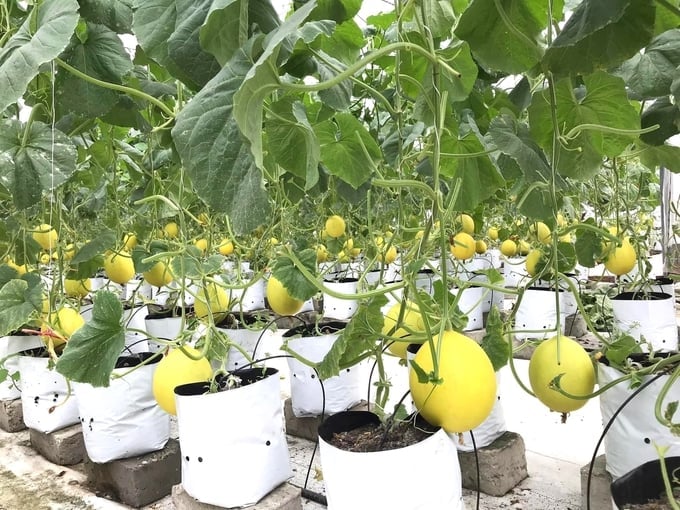
High-tech melon growing model of Song Gia Cooperative. Photo: Dinh Muoi.
When we connected with Ms Do Thi Thuy Ha - Director of Song Gia Investment and Development Cooperative (Song Gia Cooperative) in Thuy Nguyen district, we learned that she is with the delegation of Hai Phong City in Belgium to connect the export of agricultural products to the Kingdom of Belgium. This is a typical example of realizing the expectations of cooperatives in investing in the development of high-quality agricultural production.
Song Gia Cooperative has nearly 7,000 m2 to focus on producing greenhouse fruit and vegetable products. This is the most methodically invested model of growing vegetables, tubers and fruits using the organic method, utilizing a net house with a drip irrigation system for export in Hai Phong.
Currently, the cooperative is growing melons such as: Bach Ngoc Duong, Kim Ngoc Duong, Kim Hoang Hau, and strawberries... A year, we grow 4 short-term fruit tree crops, including 3 main crops. Each melon crop usually lasts 65-70 days, and the cooperative's melon output after one crop can reach over 10 tons. Melon products sold at the garden have an average price of VND 60,000/kg.
Ms Ha shared that the basic difference between the cooperative's model of growing vegetables and fruits in net houses with other models is not only due to the large scale and synchronous investment but also due to the closed process that the unit has successfully built and controlled.

Ms. Ha and the leaders of the Hai Phong Department of Science and Technology went to the EU to expand cooperation in the production and consumption of agricultural products. Photo: CTV.
To achieve the best quality, each melon root only produces 1 fruit, and the unit uses 100% microbiological insecticides and pesticides. The cooperative reserves a dedicated earthworm farming area with an area of 250 m2 to provide fertilizer products for the farm. Vermicompost products, after being collected from the farm, will be mixed with rice husk, bran, coconut fibre, soil and some other compounds to make a soil-growing medium. Vermicompost products, after being collected from the farm, will be mixed with rice husk, bran, coconut fibre, soil and some other compounds to make a soil-growing medium.
According to Ms Ha, the biggest difficulty in the process of growing short-term fruit trees in a net house, according to Ms Ha, is pest prevention. Normally, growing melons outdoors will not prevent the fruit from having black spots caused by melon beetles and bee stings. To limit the melon's roughness and black spots, growers often have to spray a lot of chemical pesticides.
The same goes for growing melons in greenhouses, although greenhouse technology contributes to significantly reducing pest burden compared to traditional growing methods. However, because melons are grown in rotation, some pests and diseases such as aphids, thrips, and fungi still arise. Only when disease prevention is well controlled and handled using microbiological methods, without using chemical pesticides, will the products be safe and clean.
To proactively prevent pests and diseases, the cooperative currently buys original microorganisms from microbiology research laboratories for propagation. To cultivate microorganisms, the staff in charge will use preparations such as brown sugar water, and bran, combined with many other compounds such as lemongrass essential oil,... Each type of microorganism will be used to prevent a different type of pest and disease.
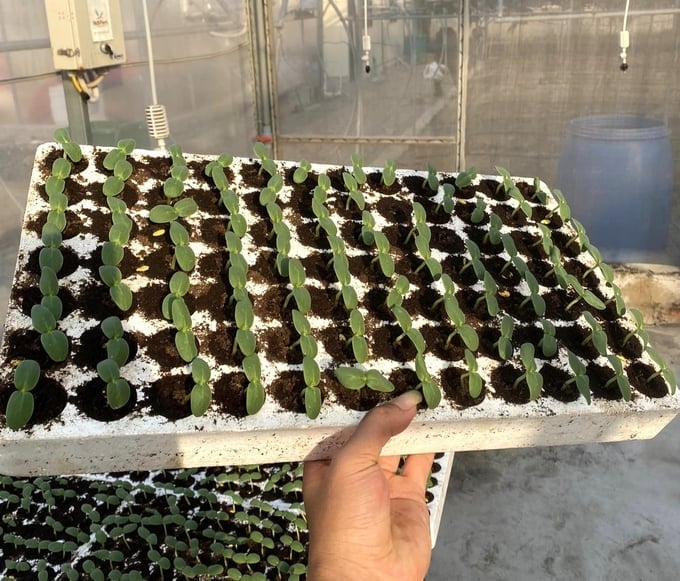
Mastering technology to enhance the value of agricultural products. Photo: Dinh Muoi.
At the same time, we must strictly follow basic principles such as: proper medicine, accurate timing, the right dosage and the correct way. During the cultivation process, cooperative staff continuously monitor the growth of plants and types of pests that arise and report them to the technical staff of the research unit, providing microbial seeds to adjust accordingly.
According to research, currently, 100% of products produced by the cooperative such as soil, fertilizer from earthworms, and biological pesticides... The results show that the tree grows very well, and the fruit quality is delicious and clean. The cooperative's main cantaloupe product is periodically inspected by the Department of Agriculture, Forestry and Fisheries Quality Management Region I. All related indicators (41 indicators) are of good quality and meet the standards for export.
“The cooperative has invested more than VND 6 billion to install a 3,500m2 net house, build infrastructure including roads around the farm and booths to introduce the cooperative's products and local OCOP products, experience area for visitors... Although the initial investment cost for a melon-growing nethouse system is quite large, in return the lifespan of the nethouse can last from 5 to 10 years. Furthermore, choosing to grow melons in a greenhouse also helps reduce pests and diseases, and increase crop productivity. This method is suitable for many spaces as well as climatic conditions, and the product is eligible for export", Ms Ha said.
According to the Hai Phong Department of Agricultural, Forestry and Fishery Product Quality Management, the model of growing melons in the nethouses of Song Gia Cooperative is a bright spot in clean agricultural production in Hai Phong City, meeting export criteria. In recent years, production activities here have brought high income and created jobs for workers in the area. It is a place for people to visit and learn about production experience.
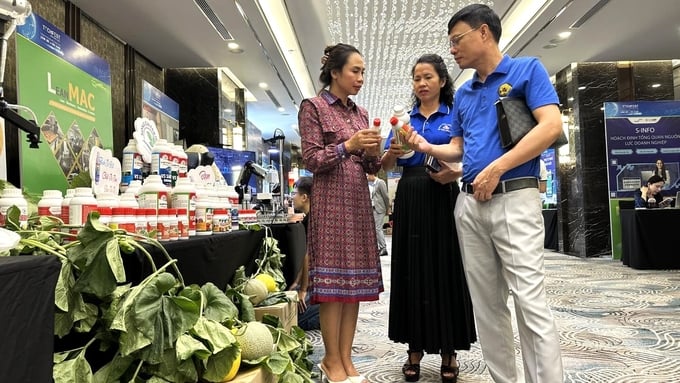
Ms. Nguyen Thi Ha introduced the application of microbiology to growing high-quality melons to customers. Photo: Dinh Muoi.
Clearly, with a creative, methodical, professional approach, promoting the strengths of products and taking advantage of policy mechanisms, units, businesses and cooperatives can completely take their products far and wide, increasing people's income.
Translated by Hoang Duy

(VAN) Noting risks, report examines impacts of avian influenza, changing trade patterns since 2022, fish fraud, and shipping industry’s net-zero goals.

(VAN) Mr. Tran Quang Bao, General Director of the Forestry and Forest Protection Department, met and worked with the International Wood Products Association to promote cooperation in the field of timber trade.

(VAN) China's outbound shipments of rare earths in May jumped 23% on the month to their highest in a year, though Beijing's export curbs on some of the critical minerals halted some overseas sales.

(VAN) To sustain capital flow, administrative reform alone is not enough; what farmers truly need is an ecosystem where both government and businesses grow together in support.
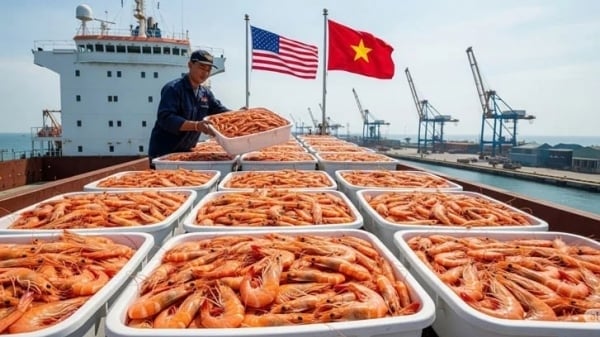
(VAN) Vietnam and the United States are proactively working together, each in their own way, to ensure that every container of agricultural goods carries not just products, but also long-term trust and value.

(VAN) Stores have started selling rice from the government’s stockpile to feed demand for the staple.
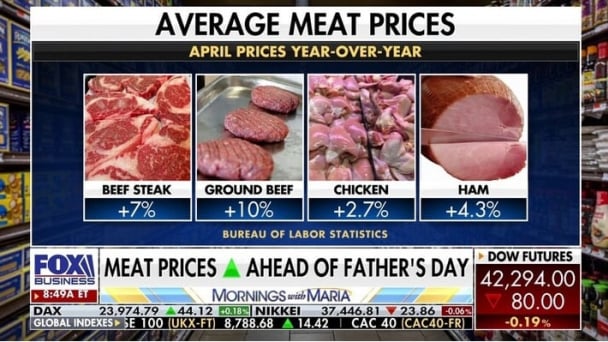
(VAN) Omaha Steaks CEO says rebuilding cattle herds will take about a year to ease price pressures.